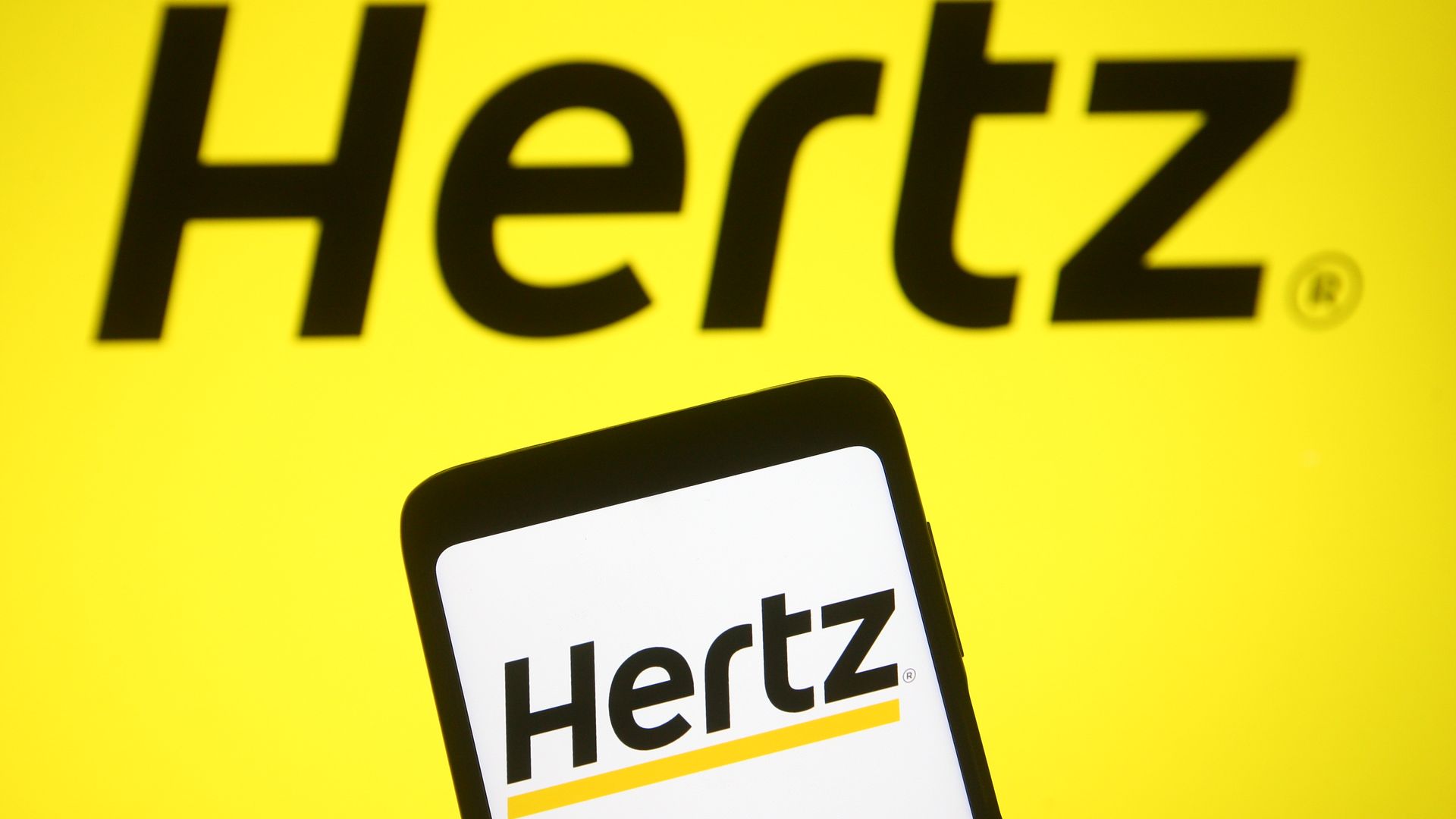| | | | | | | Presented By ProEdge, a PwC Product | | | | Axios Markets | | By Aja Whitaker-Moore ·May 13, 2021 | | Good morning! ☀️ Was this email forwarded to you? Sign up here. Thanks for all the feedback on population growth and how it relates to our lives and the economy. Keep talking to me at aja.moore@axios.com or on Twitter @AjaWMoore. (Today's Smart Brevity count: 1,311 words, 5 minutes.) | | | | | | 1 big thing: ETFs for everything |  | | | Illustration: Sarah Grillo/Axios | | | | Happiness. Weed. Robots. Water. Whatever the theme, there's probably an ETF promoting a basket of stocks related to it, Axios Closer author Courtenay Brown writes. Why it matters: Thematic ETFs are an investment mania side effect. There's newfound retail investor interest in narrow exposure to hot corners of the stock market. More are launching to meet the moment. By the numbers: In the past quarter alone, inflows into thematic ETFs hovered close to all of last year's, per ETF data provider TrackerInsight. - The backdrop: More ETFs debuted in the U.S. last year than at any point in the past decade, according to Morningstar Direct data.
Catch up quick: Thematic ETFs have been around for years. Issuers are betting new pandemic-era traders want niche exposure to "crypto innovators," companies "highly supportive of Democratic candidates" (DEMZ) or professional sports. - "People are more risk tolerant in a low interest rate environment, they're willing to speculate," says Todd Rosenbluth, head of ETF and mutual fund research at CFRA.
- There's the allure of investors whose names have become more popular on social media, like Cathie Wood — whose Ark Innovation Fund is a poster child for the thematic phenomenon. (It's also one of the biggest by assets.)
- Thematic funds' assets under management have more than tripled, to roughly $133 billion, in the past year. That's about 2% of overall ETF assets.
What they're saying: The labels "may sound good, but you have to look under the hood to make sure it's not a marketing technique," and stuffed with stocks that run counter to its advertised mission, Drew Voros, editor-in-chief of ETF.com, tells Axios. The intrigue: Thematic funds shed about $1.6 billion in assets in May, Bloomberg reports. - Some returns are down, too. Wood's flagship ETF declined more than 30% from its peak, in a swift reversal.
- Returns for cloud computing and clean energy ETFs have also dropped after a stellar 2020, as CNBC notes.
What to watch: The one investment mania that's ETF-less? Bitcoin. Driving the news: A slew of financial bigwigs have applications in for bitcoin ETFs. U.S. regulators recently punted a decision on whether to allow them to later this summer. - The SEC warned Tuesday about the risk of mutual funds with exposure to the bitcoin futures market.
- However, North America's first bitcoin ETF was approved in Canada earlier this year.
The bottom line: "If there's a theme that can be put into an ETF wrapper, it either already exists in an ETF wrapper — or it's under consideration," says Rosenbluth. Go deeper. |     | | | | | | 2. Catch up quick | | The S&P 500 and Dow Jones both slid again Wednesday, after higher-than-expected April inflation numbers. Both indexes experienced their steepest three-day declines in about seven months. (WSJ) Elon Musk suspended customers' ability to pay for Tesla vehicles with bitcoin, citing the environmental impact of bitcoin mining. This reverses a decision he made in March approving the cryptocurrency as a method for purchasing Teslas in the U.S. (Axios) Colonial Pipeline has begun restarting its operations after a cyberattack over the weekend led to a shutdown. The pipeline, which provides 45% of the East Coast's fuel, aims to restore full service within days. (Axios) Canadians are anxious to cool their buoyant housing market. Many would like the country's central bank to raise rates in order to rein in demand. (Bloomberg) |     | | | | | | 3. The OG meme stock's revenge |  | | | Photo Illustration by Pavlo Gonchar/Getty Images | | | | Hertz was the original meme stock we couldn't make sense of. A Robinhood-fueled stock frenzy after the car rental giant's May 2020 bankruptcy filing spawned finger-wagging and ridicule — but it turns out the day traders were right, writes Axios' business editor Kate Marino. What's new: Hertz's latest bankruptcy plan, in which Knighthead Capital Management and Certares Management will buy the company for $7.4 billion, calls for equity holders to receive about $8 per share, Bloomberg reported Wednesday. Why it matters: Usually shareholders of bankrupt companies lose their entire investment, while the distressed debt investors make money by taking over the company. That isn't happening this time. Our thought bubble: The unusual payout stems from a string of rare events that make it unlikely to be repeated very often, if at all. - Those circumstances include a once-in-a-generation (hopefully) pandemic, unprecedented government intervention in market liquidity, and supply chain issues that have more recently made rental car rates skyrocket.
Backstory: Hertz filed for Chapter 11 after car rental volumes evaporated at the onset of the pandemic. - The technical reason the company headed to court is that it effectively got a margin call on debt backed by its fleet of cars when the refinancing market was also all but shut down.
- Hertz stock was around $3 at the time and shot up as high as $6.25 in June.
- The stock euphoria was ignored and ridiculed by investors who thought they knew better — mostly in the bond market. The company's unsecured bonds were trading at a mere 30 cents on the dollar, and they stood in line to be repaid in full with funds from a bankruptcy sale — ahead of the stock.
Yes, but: Soon after Hertz filed, people were already renting cars again, for a summer travel season that would lack the option of European vacations or flying to islands. - An unexpected bidding war this past month resulted in billions more to hand out to pre-bankruptcy investors, compared with Hertz's original debt repayment plan.
The bottom line: The rapid fall and quick recovery in the economy and markets created many winners and losers. Hertz shareholders were among the lucky. |     | | | | | | A message from ProEdge, a PwC Product | | Align skills and culture with the changing nature of work | | |  | | | | Readying the enterprise for the future typically includes investment in new technologies. But it also requires ensuring your organization has the right skills to make the most of these technologies. Read the guide from ProEdge, a PwC Product. | | | | | | 4. First look: Stephen and Ayesha Curry join One Million Black Women |  | | | Stephen Curry and Ayesha Curry. Photo by Steve Jennings/Getty Images | | | | Stephen and Ayesha Curry are joining the advisory council for Goldman Sachs' One Million Black Women initiative, Axios is first to report. Why it matters: The initiative has committed to invest more than $10 billion in Black women over the next 10 years. It comes as banks and large companies are increasingly putting money behind rhetoric about advancing racial equity. What's new: Goldman hosted 17 listening sessions and heard from more than 10,000 Black women to guide investment decisions. - The advisory council will conduct its first meeting on May 17 to offer recommendations for the initiative's first set of investments.
- The bank will announce the first investments shortly after.
What they're saying: "The One Million Black Women initiative has, from the start, worked to listen to the ideas, concerns, and aspirations of Black women," says council member Valerie Montgomery Rice, who also serves as president and dean of Morehouse School of Medicine. - "The $10 billion investment will allow for more Black women to realize their full potential and become the economic drivers we know they are."
Go deeper into the fight to equalize "Black Womenomics." |     | | | | | | 5. Travel is back |  | | | Illustration: Sarah Grillo/Axios | | | | Multiple indicators now show how pent-up travel demand is playing out, as the U.S. exits lockdown mode, Axios' Hope King writes. Why it matters: Close to half of all Americans have had at least one dose of a COVID-19 vaccine, enabling a growing economic recovery in the hard-hit travel and leisure sectors. - More than half of the 8 million jobs lost in leisure and hospitality in March and April last year have come back, with 331,000 jobs added in April this year alone.
By the numbers: April bookings were up 11% compared with April 2019, according to data provided exclusively to Axios from American Express Travel. - Based on last month's figures, the vast majority of people are staying domestic — 87% — a trend consistent across age groups.
- But 39% plan to travel internationally within the year.
- New York City, Los Angeles, Atlanta, Dallas, Miami, Chicago, Charlotte, Denver, San Francisco and Phoenix are the top 10 U.S. destinations.
- Sydney, Melbourne, London, Dubai, Tokyo, Hong Kong, Singapore and Paris top the list of international destinations.
The big picture: Pent-up demand for services is on the rise, and nearing the level of demand for goods. - Flight bookings grew 11% in March, inching closer to e-commerce spending, according to Adobe Analytics.
- Flight bookings for this year's December holiday season were up 17% as of March, versus March 2019. Thanksgiving bookings are 9% higher, per Adobe.
- But the more lucrative business travel segment may never fully recover, Booking.com CEO Glenn Fogel told Axios earlier this year.
What to watch: As leisure returns, concerns about worker shortages (and the cause) grow. - There were a record number of open jobs in the U.S. in March — with the highest postings for restaurant, bar, hotel, manufacturing, construction and retail positions.
|     | | | | | | A message from ProEdge, a PwC Product | | Align skills and culture with the changing nature of work | | |  | | | | Readying the enterprise for the future typically includes investment in new technologies. But it also requires ensuring your organization has the right skills to make the most of these technologies. Read the guide from ProEdge, a PwC Product. | | | | | | Axios thanks our partners for supporting our newsletters.
Sponsorship has no influence on editorial content. Axios, 3100 Clarendon Blvd, Suite 1300, Arlington VA 22201 | | | You received this email because you signed up for newsletters from Axios.
Change your preferences or unsubscribe here. | | | Was this email forwarded to you?
Sign up now to get Axios in your inbox. | | | | Follow Axios on social media:    | | | | | |







No comments:
Post a Comment